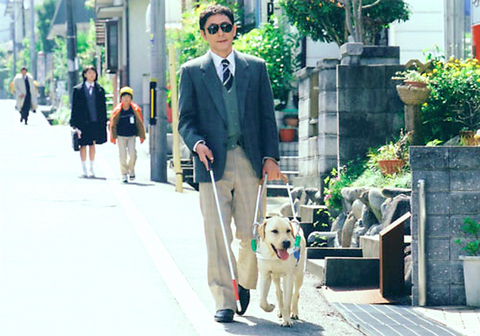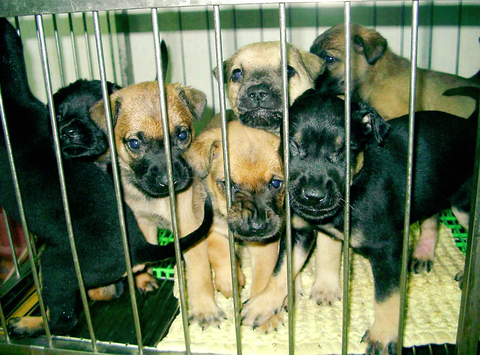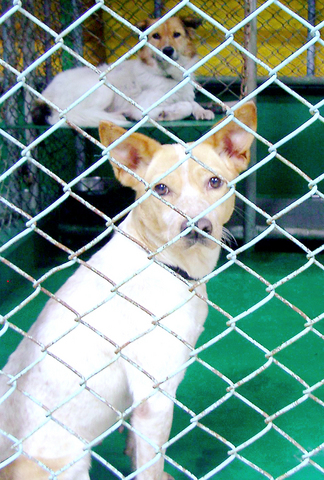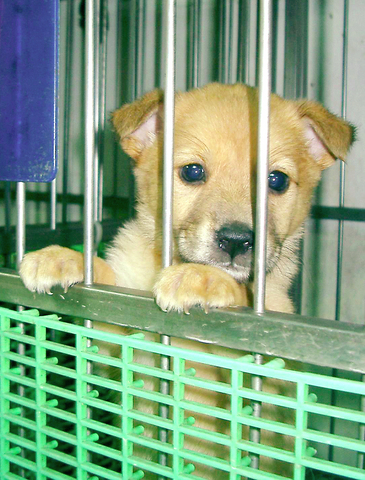The so-called "pet shop street" in the Shilin night market has 10 small pet shops congregated in a narrow hallway off the market, where dozens of puppies, including two beige puppy Labrador retrievers, are piled on top of each other in a glass display case.
"Look! It's Quill! So cute! I wish I could take it home!" said one woman in the crowd of gawkers at the window.

PHOTO: COURTESY OF FLASH FORWARD ENTERTAINMENT
The pet-shop owner held up one of the Labradors and said that "Quill" costs NT$23,000, down already from November, when the Japanese film by the same name was melting hearts nationwide.

PHOTO: YU SEN-LUN, TAIPEI TIMES
Because of the hit movie Quill, a film about a guide dog for the blind that raked in NT$90 million at the local box office, Labradors in Taiwan are now simply called Quills.
The cuddly image of Quill and his loyal spirit have been attributed to a recent trend for Labradors as pets. But what worries animal conservationists and veterinarians is that before long, these cute Labrador puppies will outgrow their owners' apartments and end up roaming the streets or languishing in stray dog centers, waiting to be put down.

The origins of a fad

PHOTO: YU SEN-LUN, TAIPEI TIMES
In 2001, a photographer published The Life of Guide Dog Quill, in which the photographer spent 12 years chronicling Quill's birth, growth, training and eventual death. With its abundant black-and-white photos recording the touching interactions between the dog and his blind masters, the book immediately became a bestseller in Japan.
The book was released in Taiwan in 2002, and by the end of last year, had sold more than 120,000 copies. A children's version of the book was also released and has been widely used as an elementary school textbook.
Last year, the book was adapted to film by director Yoichi Sai.
Japanese national TV channel NHK also produced a seven-hour TV drama titled The Life of Guide Dog Quill (
"There is always a pet trend after a hit movie. A few years ago it was doberman pinschers, then it was old English sheep dogs and dalmatians. Now it's Labrador retrievers," said Huang Ching-jung (
"But in six months to one year's time, there will be a wave of abandoned Labradors," Huang said.
Supply and demand
At Shilin night market, a puppy Labrador costs from NT$18,000 to NT$23,000. In November when the movie was screening, the puppies went for as high as NT$30,000.
"Labradors are not as docile as they appear in the movies. And they are not good watchdogs. They are working dogs," said Huang, a licensed veterinarian.
Huang warned that Labrador retrievers are susceptible to skin diseases and genetic problems with their hip joints. Recently, Huang said, he has seen a jump in the number of people bringing in Labradors for joint problems.
But the hype around breeding and selling Labradors has not abated quite yet. Last month, it was reported in Kaohsiung that a pig-farm owner had sold all his pigs to begin breeding Labradors and cash in on the trend.
The sanitary issues of raising more than 50 Labradors in a pigpen apparently didn't set off any alarms, because with demand so high, all the puppies were sold even before they were born. Some pet-shop owners could not wait for the puppies to reach one month old, nor did they have time to check the puppies' health.
"They were brought to the shops just 10 days old," the pig pen owner was quoted as saying on local TV news.
Dirty business
"Taiwan's pet shops and pet breeding businesses are not functioning healthily. Also, self-discipline is lacking among proprietors," said Hank Lee (
"This is why we occasionally see a dog trend followed about six months later by a wave of abandoned dogs. The dogs are either discarded on the streets or sent to stray dog shelters, staying for a few days before being put down," Lee said.
In Taipei City, for example, there are hundreds of pet shops selling and breeding dogs, but, according to the government's own statistics, there are only 50 licenses issued by the Taipei Municipal Institute of Animal Health (
In Europe, Lee said, dog breeders regulate themselves by restricting dogs younger than 1 year old from breeding and limit a bitch to one litter per year.
Such agreements are non-existent in Taiwan.
At the Taipei Animal Shelter (台北市動物之家), 9,000 to 10,000 dogs annually pass through the shelter, which accommodates only 320.
Seventy percent of the dogs are taken off the streets. Once in the shelter, a dog stays an average of 10 days to two weeks, waiting to be adopted. If a dog is not adopted, it will be euthanized.
"We usually let a dog stay longer if it is in good condition. Public shelters in other counties and cities usually let dogs stay from three to seven days," said a veterinarian surnamed Lu working at the shelter.
About 40 percent of the 9,000 dogs in the shelter are adopted, representing the highest adoption rate among public shelters in Taiwan.
Blind to the issue
According to Lu, the shelter hasn't had any Labradors yet, but they are expected to arrive. "In the past we had a few dalmatians and we have had quite a few beagles a few months after the trend for those dogs passed," he said.
Ironically, despite the popularity of the film Quill, the issue of guide dogs for the blind is rarely raised and widely neglected by the public.
With 50,000 visually-challenged people in Taiwan, there are only eight blind-serving guide dogs, according to the Taiwan Guide Dog Association (台灣導盲犬協會). There is also a lack of training professionals and schools. There are only two qualified guide-dog trainers in Taiwan, according to the association.
The Taiwan Guide Dog Association is now calling for volunteer families to be host families for guide dogs. Volunteers are required to take care of the dog for a year, after which time the dog will be taken to guide-dog training centers.
"Perhaps the best way to express love to a Labrador dog is not to keep them as pets, but to help them to become more valuable for human beings," said Hank Lee from Life Conservationist Association.

May 11 to May 18 The original Taichung Railway Station was long thought to have been completely razed. Opening on May 15, 1905, the one-story wooden structure soon outgrew its purpose and was replaced in 1917 by a grandiose, Western-style station. During construction on the third-generation station in 2017, workers discovered the service pit for the original station’s locomotive depot. A year later, a small wooden building on site was determined by historians to be the first stationmaster’s office, built around 1908. With these findings, the Taichung Railway Station Cultural Park now boasts that it has

The latest Formosa poll released at the end of last month shows confidence in President William Lai (賴清德) plunged 8.1 percent, while satisfaction with the Lai administration fared worse with a drop of 8.5 percent. Those lacking confidence in Lai jumped by 6 percent and dissatisfaction in his administration spiked up 6.7 percent. Confidence in Lai is still strong at 48.6 percent, compared to 43 percent lacking confidence — but this is his worst result overall since he took office. For the first time, dissatisfaction with his administration surpassed satisfaction, 47.3 to 47.1 percent. Though statistically a tie, for most

In February of this year the Taipei Times reported on the visit of Lienchiang County Commissioner Wang Chung-ming (王忠銘) of the Chinese Nationalist Party (KMT) and a delegation to a lantern festival in Fuzhou’s Mawei District in Fujian Province. “Today, Mawei and Matsu jointly marked the lantern festival,” Wang was quoted as saying, adding that both sides “being of one people,” is a cause for joy. Wang was passing around a common claim of officials of the People’s Republic of China (PRC) and the PRC’s allies and supporters in Taiwan — KMT and the Taiwan People’s Party — and elsewhere: Taiwan and

Six weeks before I embarked on a research mission in Kyoto, I was sitting alone at a bar counter in Melbourne. Next to me, a woman was bragging loudly to a friend: She, too, was heading to Kyoto, I quickly discerned. Except her trip was in four months. And she’d just pulled an all-nighter booking restaurant reservations. As I snooped on the conversation, I broke out in a sweat, panicking because I’d yet to secure a single table. Then I remembered: Eating well in Japan is absolutely not something to lose sleep over. It’s true that the best-known institutions book up faster